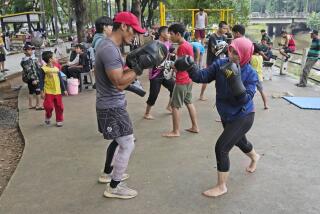Japan’s Battered Wives Find New Strength
- Share via
TOKYO — For 32 years, the housewife quietly suffered broken bones, bruises and cuts at the hands of her husband, never raising her voice, calling the police or hitting back.
But when he slammed his foot into her back three years ago, breaking her ribs and sending her to the hospital, she did what few abused wives dare in Japan.
She left.
“He never apologized--not even once. When I told him my ribs were broken, he told me there was no proof he was responsible for the injury. That’s when I finally thought I had enough,” said the woman, who requested anonymity mostly out of fear of her ex-husband but also from embarrassment.
By breaking free and seeking help from support groups, she joined a growing number of women in Japan who are speaking out against domestic abuse--something that had been kept quiet until recently by the victims’ shame and official neglect.
According to a 1996 survey by the Supreme Court, of the 37,395 marriage arbitration cases filed by women in Japan’s family courts, one-third involved complaints of domestic abuse. The majority ended in divorce.
“More women are beginning to refuse to tolerate the violence,” said Shun Ashizawa, a Tokyo Family Court arbitrator. “It is finally becoming an issue in Japan.”
Experts say as more Japanese women move into the work force, they are becoming more vocal about their rights. Support groups are springing up, and women are more aware of issues like domestic abuse and sexual harassment.
According to a study of domestic violence released in May by the Tokyo Metropolitan Government--the first ever done in Japan--one-third of the 1,183 women in the survey with partners said they had been battered by their husbands or boyfriends.
Nearly 7% said they were regularly abused, and 1% said they had been beaten until they collapsed.
“The problem has existed for a long time, but continued unnoticed because nobody raised the issue,” said Tomiko Dai, an official at a n women’s shelter in Tokyo.
The anonymous housewife’s case illustrates the new rejection of domestic abuse in Japan, but it also shows the forces that have kept such violence hidden for so long.
She put up with beatings for three decades. Instead of running away, she tried to be a better wife, appeasing her husband in the vain hope that keeping him satisfied would make him less violent.
“I could never fight back or complain because of fear of arousing his anger and retribution,” she said. “My mind was completely focused on how to please my husband--that was the only way to survive.”
The brutality of her home life was skillfully concealed from neighbors. In Japan, where victims can be ostracized and blamed for their own troubles, she worked hard at keeping up appearances in her Tokyo neighborhood.
Even after she decided to leave, it took her two more years to quietly carry out her plan. She finally left in April 1997.
“Words like ‘How dare you hit me’ rose up to my throat, but I couldn’t say it,” she said. “I just wrote a brief note, prepared lunch for him, then left with a tiny knapsack and a bag, saying I had a doctor’s appointment.”
“I don’t regret that I left my husband--not even a bit,” she added. “But leaving home meant I threw out 32 years of my life, and that’s what hurts me more.”
If many battered women are reluctant to complain, those who do can face a cool response. Although there is no distinction in Japanese law, domestic violence is traditionally considered different from assault involving strangers and police are reluctant to intervene, much as authorities once were in the United States and other Western nations.
When police do get involved, critics say, they often ask the woman if she really wants to press charges and risk turning her children into the offspring of a criminal --bringing shame on the family. The women often back down.
But police are changing their ways. Prefectural police departments have set up internal departments to handle domestic violence. Last year, 371 men were arrested for beating their wives--the first time that domestic violence was reported separately from other assault figures.
At the root of the domestic abuse problem--and its persistence--is the strong dominance of Japanese society by men. Michiaki Ajisawa, a member of a men’s group in Osaka that opposes domestic violence, said the use of force by men has long been accepted in Japan. “Many of us have not been taught how to express our feelings properly but [to] use violence,” he said.
Ashizawa, the court arbitrator, said that in many cases abusive husbands lack a sense of guilt or awareness that their actions are criminal. Most even see themselves as the victim whose need for attention is not fulfilled, he added. “They seem to take it for granted that their partners sympathize with them and accept their actions,” he said.
More to Read
Sign up for Essential California
The most important California stories and recommendations in your inbox every morning.
You may occasionally receive promotional content from the Los Angeles Times.













